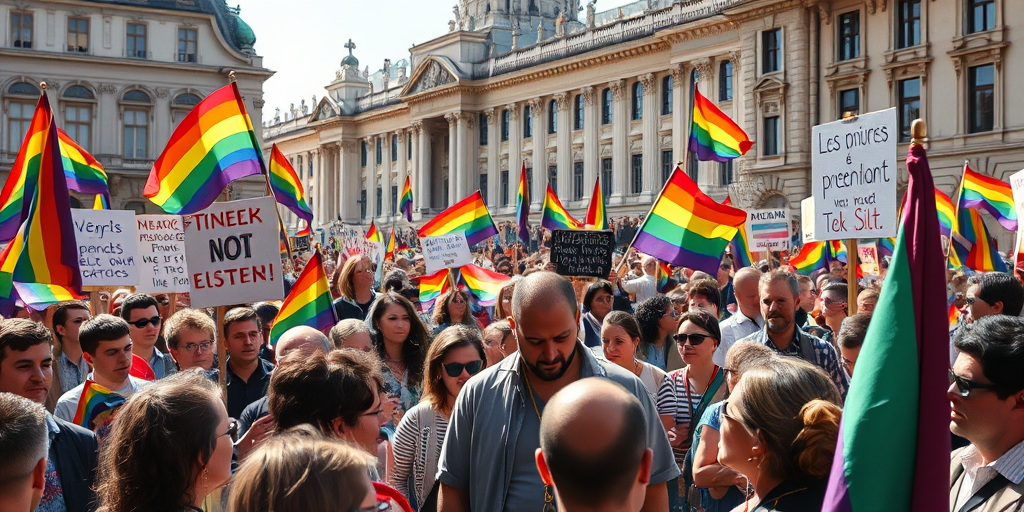Europe’s Far Right Weaponising LGBTQ+ Rights: A Deepening Divide
As Europe stands on the cusp of Pride month—a period historically cherished for celebrating diversity and advocating for LGBTQ+ rights—a dark cloud looms over the continent. Far-right politicians are increasingly using LGBTQ+ rights as a divisive political tool, exacerbating tensions within communities and contributing to a reported surge in hate crimes. Campaigners and local residents are raising the alarm, describing this tactic as a strategic maneuver to sow division and marginalize already vulnerable groups. In the process, they warn, it threatens the very fabric of democracy in Europe.
The Disconcerting Backslide on LGBTQ+ Rights
Europe, once the bastion of progress in LGBTQ+ equality with landmark achievements like marriage equality, is witnessing an unsettling reversal. Nations such as Hungary and Slovakia are at the forefront of this regression, pushing constitutional amendments that enforce rigid, binary gender definitions. Austria too is contributing to this movement, with proposals aimed at curbing LGBTQ+ rights within educational settings.
The Council of Europe has sounded the alarm over the increasing prevalence of transphobic hate speech, identifying anti-gender rhetoric as a recurring theme in political dialogue. This rising tide targets the transgender community, making them scapegoats in a broader narrative espoused by far-right factions.
“In Hungary, where Budapest Pride has been legally banned, we’re seeing a direct attack on our freedom of assembly,” explained Miklos Farkas, a prominent activist with the Hungarian LGBTQ+ Coalition. “This isn’t just about the LGBTQ+ community; it’s about eroding fundamental rights that affect all citizens.”
The Rising Tide of Violence and Fear
The rollback of LGBTQ+ rights is mirrored by a disturbing rise in violence across Europe. A 2024 survey encompassing over 100,000 LGBTIQ individuals revealed that 14% of respondents experienced physical or sexual assault in the past five years, with repeated attacks reported by one in three. These statistics paint a grim picture of the daily realities faced by the community.
This intensifying violence isn’t confined to central and eastern Europe. Western nations like France, Germany, Belgium, and Spain are also witnessing a spike in hate-related incidents. Within the trans community, young individuals are facing mounting mental health challenges exacerbated by societal discrimination and increased suicide risks.
ILGA-Europe’s Katrin Hugendubel characterizes this situation as an existential threat to democratic values. “The tactic here is to scapegoat and divide, binding voters to far-right ideologies. It’s a manipulation of societal fears that undermines our collective humanity,” she cautioned.
The Calls for Action and the EU’s Tepid Response
Despite the alarming trend, the response from European Union leadership has been underwhelming. Seventeen member states have recently pressured the EU to challenge Hungary’s anti-LGBTQ+ policies. However, substantial action from the upper echelons of the EU remains elusive. This inaction leaves many within the LGBTQ+ community feeling isolated and vulnerable.
“Inaction is complicity. The EU must leverage its legal framework to ensure fundamental rights aren’t merely theoretical, but actively protected and enforced,” asserts David Klein, a European human rights analyst. “Only then can we resist these regressive forces.”
The Resilience of Pride
In the face of escalating discrimination, Pride remains a potent symbol of resistance. Historically rooted in activism, it serves both as a celebration of progress and a protest against ongoing injustices. This year’s Pride events carry deeper significance as they confront heightened hate speech and restrictive policies.
Isabella Romero, a spokesperson for Spain’s Rainbow Coalition, encapsulates this resilient spirit. “Pride is a statement of existence and defiance. In marching, we assert our right to be heard and our refusal to be diminished by hate.”
Local Impact and Resources
For American residents observing these developments from afar, the implications serve as both a cautionary tale and a rallying cry. Similar political tactics employing divisive rhetoric have been observed within parts of the US, underscoring the importance of vigilance and advocacy in protecting the rights of marginalized groups.
American citizens concerned with these issues can connect with local chapters of international human rights organizations or participate in educational events to raise awareness about the global fight for LGBTQ+ rights.
Europe’s ongoing struggle serves as a stark reminder that the fight for equality is global, interconnected, and far from over. As individuals and communities around the world gear up to celebrate Pride month, the urgency to confront these challenges with solidarity and resolve has never been more critical.







